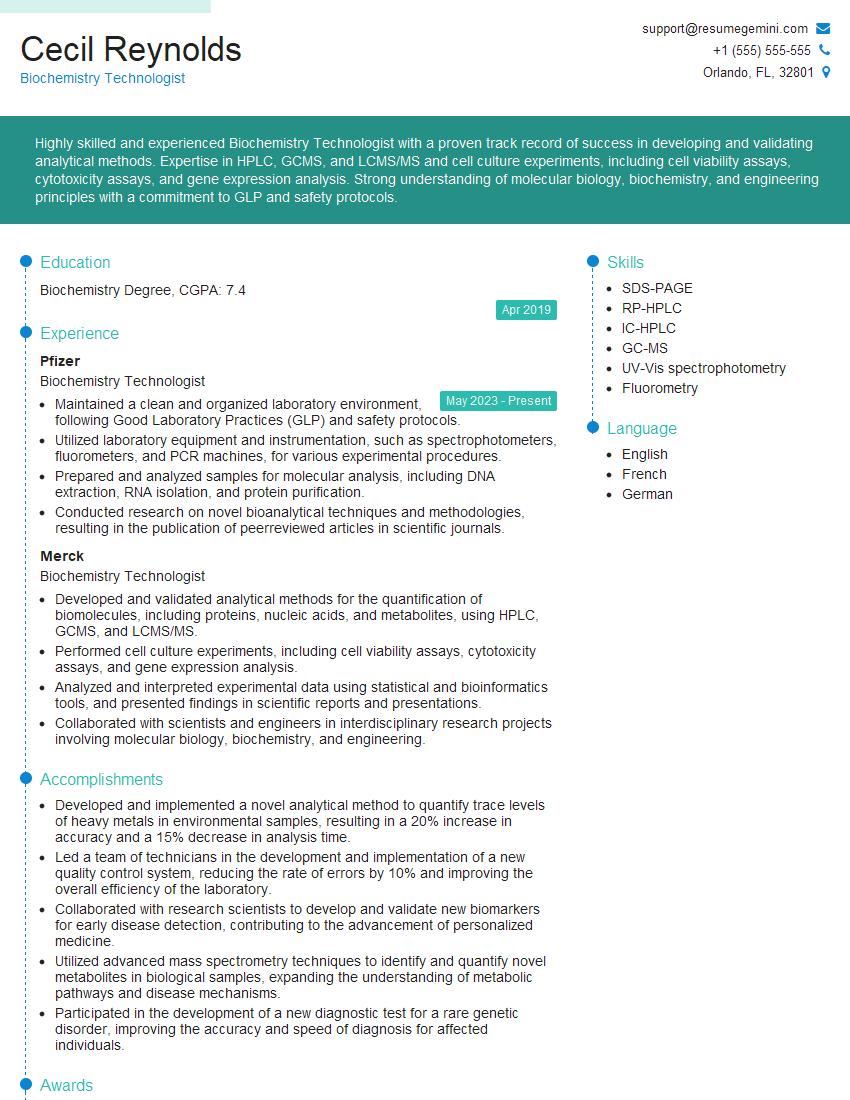Are you a seasoned Biochemistry Technologist seeking a new career path? Discover our professionally built Biochemistry Technologist Resume Template. This time-saving tool provides a solid foundation for your job search. Simply click “Edit Resume” to customize it with your unique experiences and achievements. Customize fonts and colors to match your personal style and increase your chances of landing your dream job. Explore more Resume Templates for additional options.

Cecil Reynolds
Biochemistry Technologist
Summary
Highly skilled and experienced Biochemistry Technologist with a proven track record of success in developing and validating analytical methods. Expertise in HPLC, GCMS, and LCMS/MS and cell culture experiments, including cell viability assays, cytotoxicity assays, and gene expression analysis. Strong understanding of molecular biology, biochemistry, and engineering principles with a commitment to GLP and safety protocols.
Education
Biochemistry Degree
April 2019
Skills
- SDS-PAGE
- RP-HPLC
- IC-HPLC
- GC-MS
- UV-Vis spectrophotometry
- Fluorometry
Work Experience
Biochemistry Technologist
- Maintained a clean and organized laboratory environment, following Good Laboratory Practices (GLP) and safety protocols.
- Utilized laboratory equipment and instrumentation, such as spectrophotometers, fluorometers, and PCR machines, for various experimental procedures.
- Prepared and analyzed samples for molecular analysis, including DNA extraction, RNA isolation, and protein purification.
- Conducted research on novel bioanalytical techniques and methodologies, resulting in the publication of peerreviewed articles in scientific journals.
Biochemistry Technologist
- Developed and validated analytical methods for the quantification of biomolecules, including proteins, nucleic acids, and metabolites, using HPLC, GCMS, and LCMS/MS.
- Performed cell culture experiments, including cell viability assays, cytotoxicity assays, and gene expression analysis.
- Analyzed and interpreted experimental data using statistical and bioinformatics tools, and presented findings in scientific reports and presentations.
- Collaborated with scientists and engineers in interdisciplinary research projects involving molecular biology, biochemistry, and engineering.
Accomplishments
- Developed and implemented a novel analytical method to quantify trace levels of heavy metals in environmental samples, resulting in a 20% increase in accuracy and a 15% decrease in analysis time.
- Led a team of technicians in the development and implementation of a new quality control system, reducing the rate of errors by 10% and improving the overall efficiency of the laboratory.
- Collaborated with research scientists to develop and validate new biomarkers for early disease detection, contributing to the advancement of personalized medicine.
- Utilized advanced mass spectrometry techniques to identify and quantify novel metabolites in biological samples, expanding the understanding of metabolic pathways and disease mechanisms.
- Participated in the development of a new diagnostic test for a rare genetic disorder, improving the accuracy and speed of diagnosis for affected individuals.
Awards
- Recipient of the American Association for Clinical Chemistry Young Investigator Award for Outstanding Research in Analytical Biochemistry.
- Recognized by the International Society for Clinical Laboratory Science for exceptional contributions to the field of clinical biochemistry.
- Received the Employee of the Year Award for exceptional dedication and contributions to the laboratory.
- Recognized as a Top Performer in the Laboratory Medicine Division for consistently exceeding expectations and delivering exceptional results.
Certificates
- American Board of Clinical Chemistry (ABCC)
- American Association for Clinical Chemistry (AACC)
- Clinical Laboratory Improvement Amendments (CLIA)
- International Organization for Standardization (ISO) 17025
Career Expert Tips:
- Select the ideal resume template to showcase your professional experience effectively.
- Master the art of resume writing to highlight your unique qualifications and achievements.
- Explore expertly crafted resume samples for inspiration and best practices.
- Build your best resume for free this new year with ResumeGemini. Enjoy exclusive discounts on ATS optimized resume templates.
How To Write Resume For Biochemistry Technologist
- Quantify your accomplishments with specific metrics whenever possible.
- Highlight your skills and experience in a way that is relevant to the job you are applying for.
- Proofread your resume carefully before submitting it.
- Tailor your resume to each job you apply for.
Essential Experience Highlights for a Strong Biochemistry Technologist Resume
- Developed and validated analytical methods for the quantification of biomolecules, including proteins, nucleic acids, and metabolites, using HPLC, GCMS, and LCMS/MS.
- Performed cell culture experiments, including cell viability assays, cytotoxicity assays, and gene expression analysis.
- Analyzed and interpreted experimental data using statistical and bioinformatics tools, and presented findings in scientific reports and presentations.
- Collaborated with scientists and engineers in interdisciplinary research projects involving molecular biology, biochemistry, and engineering.
- Utilized laboratory equipment and instrumentation, such as spectrophotometers, fluorometers, and PCR machines, for various experimental procedures.
- Conducted research on novel bioanalytical techniques and methodologies, resulting in the publication of peerreviewed articles in scientific journals.
Frequently Asked Questions (FAQ’s) For Biochemistry Technologist
What is a Biochemistry Technologist?
A Biochemistry Technologist is a scientist who uses their knowledge of biochemistry to develop and perform experiments in a laboratory setting. They may work in a variety of industries, including pharmaceuticals, biotechnology, and academia.
What are the educational requirements for a Biochemistry Technologist?
Most Biochemistry Technologists have a bachelor’s degree in biochemistry or a related field. Some employers may also require a master’s degree or doctorate.
What are the job duties of a Biochemistry Technologist?
Biochemistry Technologists perform a variety of tasks, including developing and performing experiments, analyzing data, and writing reports. They may also be responsible for training other laboratory staff and maintaining laboratory equipment.
What are the career prospects for a Biochemistry Technologist?
The job outlook for Biochemistry Technologists is expected to be good over the next few years. This is due to the increasing demand for biochemistry professionals in a variety of industries.
What are the salary expectations for a Biochemistry Technologist?
The salary for a Biochemistry Technologist can vary depending on their experience, education, and location. However, the median annual salary for Biochemistry Technologists is around \$60,000.
What are the benefits of working as a Biochemistry Technologist?
There are many benefits to working as a Biochemistry Technologist, including the opportunity to work in a challenging and rewarding field, the chance to make a difference in the world, and the potential for career advancement.